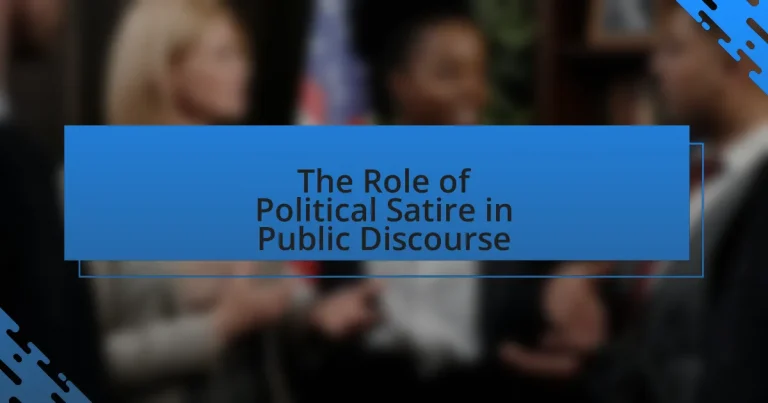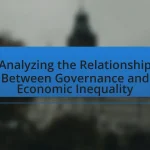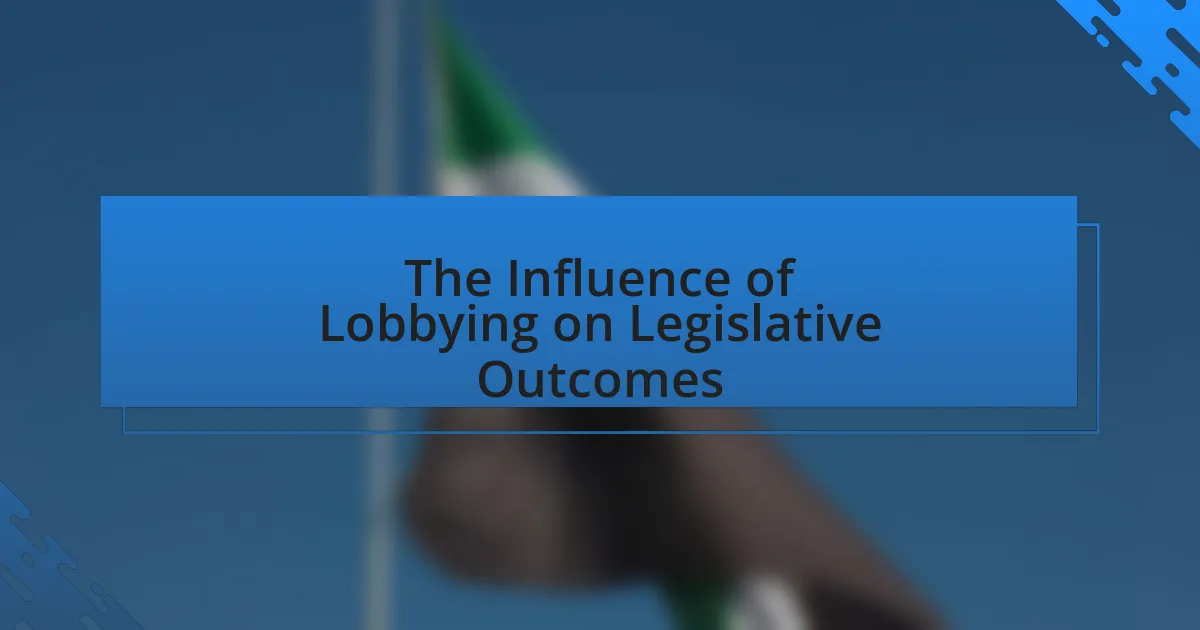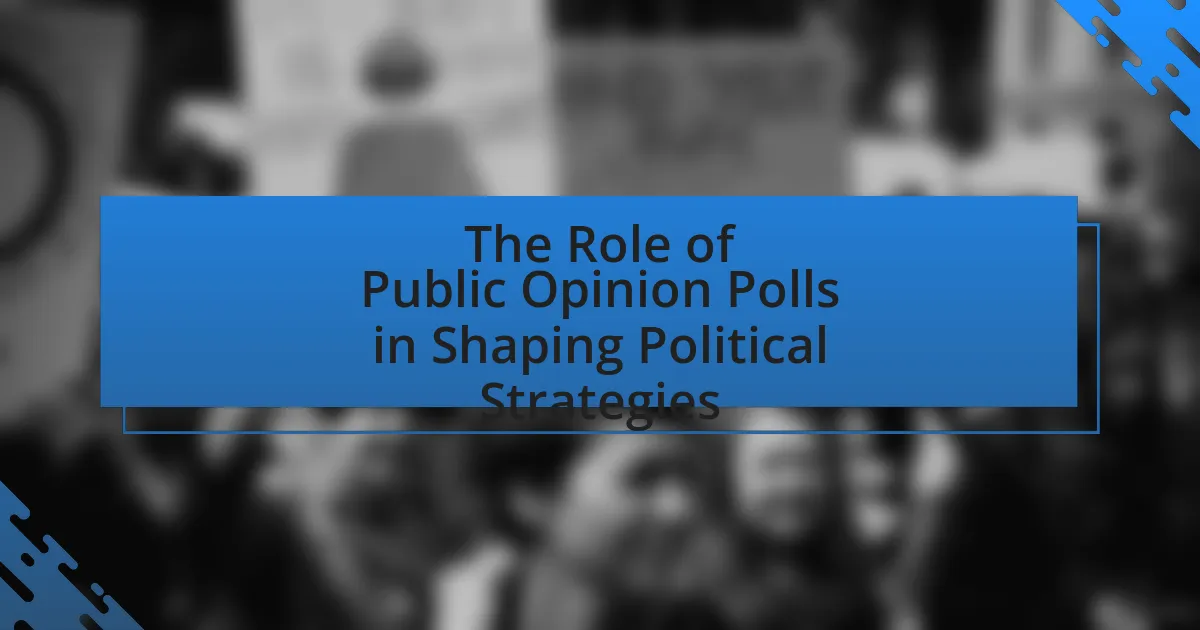Political satire serves a vital role in public discourse by providing a platform for critique and reflection on political events and figures. It utilizes humor and irony to engage audiences, making complex political topics more accessible and stimulating public debate. The article explores how political satire influences public opinion, promotes political engagement, and holds power accountable, while also examining the techniques used in satire and the varying interpretations among different audience demographics. Additionally, it discusses the historical evolution of political satire, its intersection with media and technology, and the challenges it faces in contemporary discourse, particularly regarding polarization and misinformation.
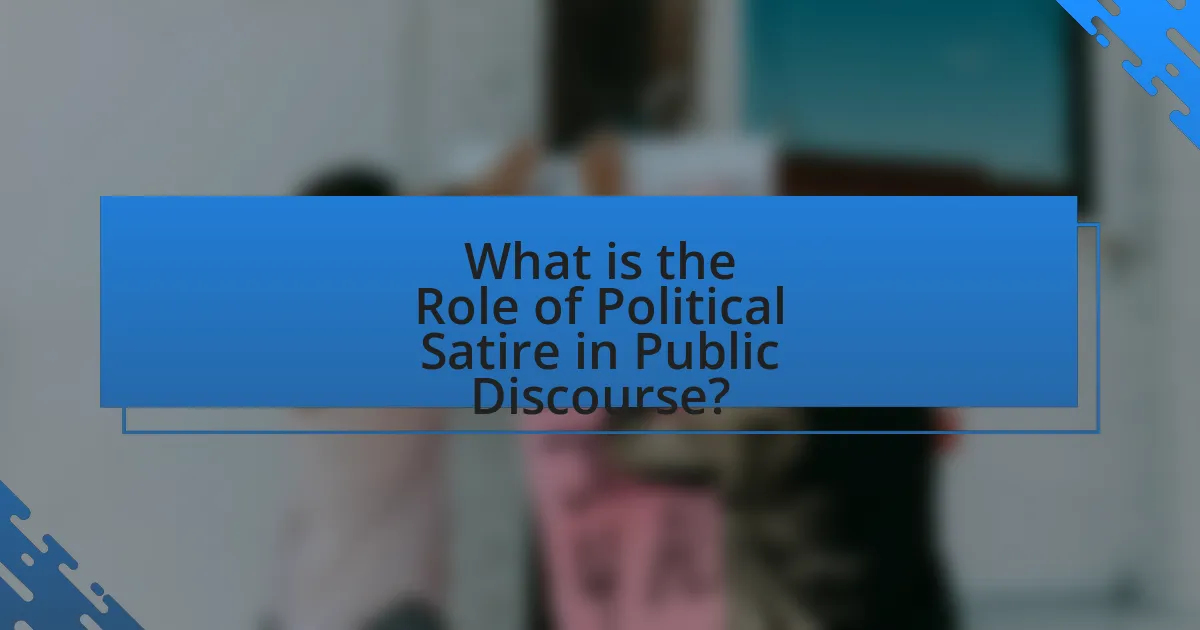
What is the Role of Political Satire in Public Discourse?
Political satire plays a crucial role in public discourse by providing a platform for critique and reflection on political events and figures. It engages audiences by using humor and irony to highlight societal issues, often making complex political topics more accessible and stimulating public debate. Research indicates that political satire can enhance political awareness and participation; for instance, a study published in the journal “Political Communication” found that exposure to satirical content increases viewers’ knowledge of political issues and encourages them to engage in political discussions. This demonstrates that political satire not only entertains but also serves as a vital tool for fostering informed citizenry and promoting democratic engagement.
How does political satire influence public opinion?
Political satire significantly influences public opinion by shaping perceptions of political figures and issues through humor and critique. This form of satire often highlights the absurdities and contradictions in political discourse, making complex topics more accessible and engaging for the audience. Research indicates that exposure to political satire can lead to increased political awareness and engagement, as viewers are more likely to discuss and reflect on the issues presented. For instance, a study published in the journal “Political Communication” found that individuals who consume political satire are more informed about current events compared to those who do not, demonstrating its role in enhancing public discourse.
What techniques are commonly used in political satire?
Political satire commonly employs techniques such as exaggeration, parody, irony, and caricature. Exaggeration amplifies the traits or actions of political figures to highlight absurdities, while parody mimics their style or behavior to critique them. Irony contrasts expectations with reality, revealing contradictions in political discourse. Caricature visually distorts features of politicians to emphasize their flaws or characteristics, making them easily recognizable and often humorous. These techniques effectively engage audiences and provoke critical thought about political issues.
How do audiences interpret political satire differently?
Audiences interpret political satire differently based on their political beliefs, cultural backgrounds, and media literacy. Research indicates that individuals with strong partisan identities often perceive satire that aligns with their views as humorous and insightful, while those with opposing beliefs may find the same content offensive or misleading. For instance, a study by M. J. Young and J. J. T. McGowan in the journal “Political Communication” found that viewers’ political affiliations significantly influenced their enjoyment and understanding of satirical content. Additionally, cultural context plays a crucial role; audiences from different regions may have varying levels of familiarity with political references, affecting their interpretation. Thus, the interpretation of political satire is not uniform but varies widely among different audience segments.
Why is political satire important in a democratic society?
Political satire is important in a democratic society because it serves as a tool for accountability and encourages public discourse. By using humor and exaggeration, political satire exposes the flaws and contradictions in political actions and policies, prompting citizens to critically evaluate their leaders. For instance, shows like “Saturday Night Live” and “The Daily Show” have historically influenced public opinion and voter behavior, as evidenced by studies indicating that viewers of satirical content are more informed about political issues compared to non-viewers. This engagement fosters a more informed electorate, which is essential for the functioning of democracy.
How does political satire promote political engagement?
Political satire promotes political engagement by making complex political issues more accessible and relatable to the public. Through humor and exaggeration, satire simplifies intricate topics, encouraging individuals to think critically about political events and policies. Research indicates that exposure to political satire can increase political knowledge and motivate viewers to participate in political discussions and activities, as evidenced by a study published in the journal “Political Communication,” which found that individuals who consume satirical content are more likely to engage in civic activities such as voting and attending town hall meetings.
What role does political satire play in holding power accountable?
Political satire plays a crucial role in holding power accountable by exposing the flaws and inconsistencies of political leaders and institutions. Through humor and exaggeration, political satire encourages critical thinking among the public, prompting them to question authority and scrutinize government actions. For instance, shows like “The Daily Show” and “Saturday Night Live” have historically highlighted political scandals and missteps, influencing public opinion and voter behavior. Research indicates that audiences of satirical content are more informed about political issues and more likely to engage in civic activities, thereby reinforcing the accountability of those in power.
What are the historical contexts of political satire?
Political satire has evolved through various historical contexts, reflecting societal attitudes and political climates. In ancient Rome, figures like Juvenal used satire to critique political leaders and societal norms, establishing a tradition that highlighted the power dynamics of the time. During the Enlightenment, satirical works by authors such as Jonathan Swift and Voltaire targeted government corruption and social injustices, influencing public opinion and encouraging reform. The rise of print media in the 18th and 19th centuries further amplified political satire, allowing for broader dissemination of satirical content, as seen in publications like “Punch” in Britain. In the 20th century, political satire became prominent in television and film, with programs like “Saturday Night Live” and “The Daily Show” shaping contemporary discourse by addressing current events and political figures through humor. Each of these historical contexts demonstrates how political satire serves as a tool for critique and reflection within public discourse, adapting to the mediums and issues of its time.
How has political satire evolved over time?
Political satire has evolved significantly from its origins in ancient Greece and Rome to contemporary digital platforms. Initially, political satire was expressed through theatrical performances and literature, with figures like Aristophanes using comedy to critique political leaders and societal norms. In the 18th century, the advent of print media allowed satirists like Jonathan Swift and Voltaire to reach broader audiences, utilizing pamphlets and essays to challenge authority and provoke thought.
The 20th century saw the rise of broadcast media, where television programs like “Saturday Night Live” and “The Daily Show” became influential in shaping public opinion and political discourse through humor. In recent years, the internet and social media have transformed political satire, enabling rapid dissemination of satirical content and fostering interactive engagement with audiences. This evolution reflects changes in technology, media consumption, and the political landscape, demonstrating how satire adapts to remain relevant in public discourse.
What significant events have shaped the landscape of political satire?
Significant events that have shaped the landscape of political satire include the establishment of television as a mass medium, the Watergate scandal, and the rise of the internet and social media. The advent of television in the 1950s allowed shows like “Saturday Night Live” and “The Daily Show” to reach wide audiences, transforming political commentary into a form of entertainment. The Watergate scandal in the 1970s provided rich material for satirists, highlighting the power of satire to critique political corruption and influence public opinion. Additionally, the emergence of the internet and social media in the 21st century has democratized political satire, enabling individuals to create and share satirical content rapidly, thus amplifying its impact on public discourse.
How does political satire intersect with media and technology?
Political satire intersects with media and technology by utilizing digital platforms to amplify its reach and influence public opinion. The rise of social media has enabled satirical content to spread rapidly, allowing creators to engage with audiences in real-time and respond to current events instantly. For instance, shows like “Saturday Night Live” and online platforms such as Twitter and YouTube have transformed how political satire is consumed, making it more accessible and interactive. According to a study by the Pew Research Center, 62% of Americans reported getting news from social media, highlighting the significant role technology plays in disseminating satirical commentary. This intersection enhances the effectiveness of political satire in shaping discourse and mobilizing audiences around political issues.
What challenges does political satire face in contemporary discourse?
Political satire faces significant challenges in contemporary discourse, primarily due to polarization and misinformation. The increasing division among political ideologies makes it difficult for satire to resonate across different audience segments, as individuals may interpret satirical content through their biased lenses. Additionally, the rapid spread of misinformation complicates the landscape, as audiences may struggle to distinguish between satire and factual reporting, leading to confusion and misinterpretation. A study by the Pew Research Center in 2020 found that 64% of Americans believe that satire can mislead people about political issues, highlighting the challenge of maintaining clarity and effectiveness in satirical commentary.
What are the effects of political satire on different demographics?
Political satire influences different demographics by shaping their political opinions, increasing political engagement, and affecting their perceptions of political figures. Research indicates that younger audiences, particularly those aged 18-29, are more likely to consume political satire, which can lead to increased political awareness and participation; for instance, a study by the Pew Research Center found that 61% of young adults reported that satire helped them understand political issues better. Conversely, older demographics may respond differently, often viewing satire as less credible, which can lead to skepticism about the information presented. Additionally, political affiliation plays a significant role; individuals with opposing political views may interpret satire in ways that reinforce their existing beliefs, as shown in a study published in the Journal of Communication, which highlighted that partisan satire often deepens political divides rather than bridging them.
How do age and education level influence the reception of political satire?
Age and education level significantly influence the reception of political satire, with younger audiences and those with higher education levels generally demonstrating a greater appreciation and understanding of satirical content. Research indicates that younger individuals are more likely to engage with and share political satire, as they are often more familiar with the cultural references and media formats used in such humor. Additionally, individuals with higher education levels tend to possess critical thinking skills that enhance their ability to interpret and appreciate the nuances of satire, as evidenced by studies showing that educated audiences are more adept at recognizing irony and satire in political discourse.
What impact does political satire have on political polarization?
Political satire significantly contributes to political polarization by reinforcing existing biases and deepening divisions among audiences. Research indicates that individuals who consume political satire often align more closely with the viewpoints presented, leading to an echo chamber effect. For instance, a study published in the journal “Political Communication” by researchers at the University of Pennsylvania found that exposure to partisan satire increases partisan identification and hostility towards opposing views. This effect is particularly pronounced among younger audiences who are more likely to engage with satirical content on social media platforms, further entrenching their political beliefs and reducing openness to differing perspectives.
What best practices can enhance the effectiveness of political satire?
To enhance the effectiveness of political satire, creators should focus on clarity, relevance, and timing. Clarity ensures that the audience easily understands the message, while relevance connects the satire to current events or societal issues, making it more impactful. Timing is crucial; delivering satire in a timely manner, especially during significant political events, maximizes its reach and resonance. For instance, satirical pieces that coincide with major political debates or scandals often gain more traction and engagement, as evidenced by the success of programs like “Saturday Night Live” during election cycles, which effectively use timely satire to comment on political events.
